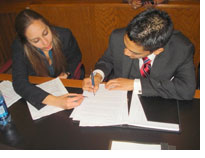 Just a few hours before her first moot court competition, Jacinth Sohi '11 was feeling pragmatic. Although she and classmate Abhi Nemani '10 had been taught legal case analysis by associate professor of government Ken Miller, andas mock trial veteransthey were comfortable performing before a jury of peers, this was new territory. For the first time in competition, they would be arguing a matter of law before a simulated Supreme Court, which would interrupt them at will with challenging questions and arguments. "Because this is a tournament to qualify teams for nationals, and since we are a new team," Sohi said at the time, "our chances of placing are probably not too high."
Just a few hours before her first moot court competition, Jacinth Sohi '11 was feeling pragmatic. Although she and classmate Abhi Nemani '10 had been taught legal case analysis by associate professor of government Ken Miller, andas mock trial veteransthey were comfortable performing before a jury of peers, this was new territory. For the first time in competition, they would be arguing a matter of law before a simulated Supreme Court, which would interrupt them at will with challenging questions and arguments. "Because this is a tournament to qualify teams for nationals, and since we are a new team," Sohi said at the time, "our chances of placing are probably not too high."
Famous last words of CMC achievers By the end of the next day, Sohi and Nemani had placed in the top 12 of the 36 teams competing at the American Collegiate Moot Court Association's Western Regional held Dec. 4-5 at Cal State Long Beach. The roster included the likes of Chapman University, the University of San Diego, Brigham Young UniversityIdaho, and Texas Wesleyan University and was described by tournament organizers as "the toughest in the country."
Representing Claremont McKenna, Sohi and Nemani were the only new school to make the top dozen, says Sohi, and the only team to advance to Saturday's elimination rounds without an oral argument coach. What's more, Sohi walked away with the Top Orator award and the team ended up earning an invitation to the National Championships to be the held January 15-16 in Miami.
"Jacinth and Abhi's hard work paid off," Ken Miller responded. "They began preparing for this competition months ago and mastered the case. It's no surprise they did so well in the competition."
Moot court competitions simulate court proceedings, with student teams competing over hypothetical legal cases and defending their arguments in less than a total of 20 minutes in front a panel of judges that includes lawyers, law faculty and federal and state judges. There are only two students per team, and neither individual knows in advance which side of the argument he/she will defend.
"We were given a case packet, which was essentially a hypothetical case, modeled off a current case before the court," Sohi explained. "The packet included a fact summary and a lower court opinion, as well as a list of authorities (the relevant case law and statutes) that we were allowed to use. This included 20 Supreme Court cases that we had to be familiar with."
This year's case was State of Olympus v. William DeNolf, Jr.
DeNolf, a 15-year-old, was convicted of aggravated rape, and because of a proposition passed by the voters of Olympus, was sentenced to life in prison without parole. Thus, one of the key issues in the case, says Sohi, was determining which penalties were appropriate for juveniles. The other issue in the case, she said, dealt with search and seizure, and the police's use of a visual-enhancement device.
"The case presented the very issues of individual rights, federalism, and national powers," explained Sohi, "that Professor Miller had addressed in his Constitutional Law class with its Supreme Court simulation." Clearly, this hands-on preparation paid dividends for the team at the tournament, however unexpected.
But because they thought advancement was so unlikely, Sohi and Nemani never planned on going to Miami in January and instead their Mock Trial team committed to a tournament that very weekend. "And that responsibility was too important to set aside," Nemani added.
Even though they won't be attending the championships this year, they plan on expanding the program, incorporating it into Mock Trial, and sending multiple teams to represent CMC next year.
CMC Team Earns Invite
to Moot Court Nationals
Topics
Contact
Office of Strategic Communications & Marketing
400 N. Claremont Blvd.
Claremont, CA 91711
Phone: (909) 621-8099
Email: [email protected]
Media inquiries: CMC Media
Email: [email protected]
